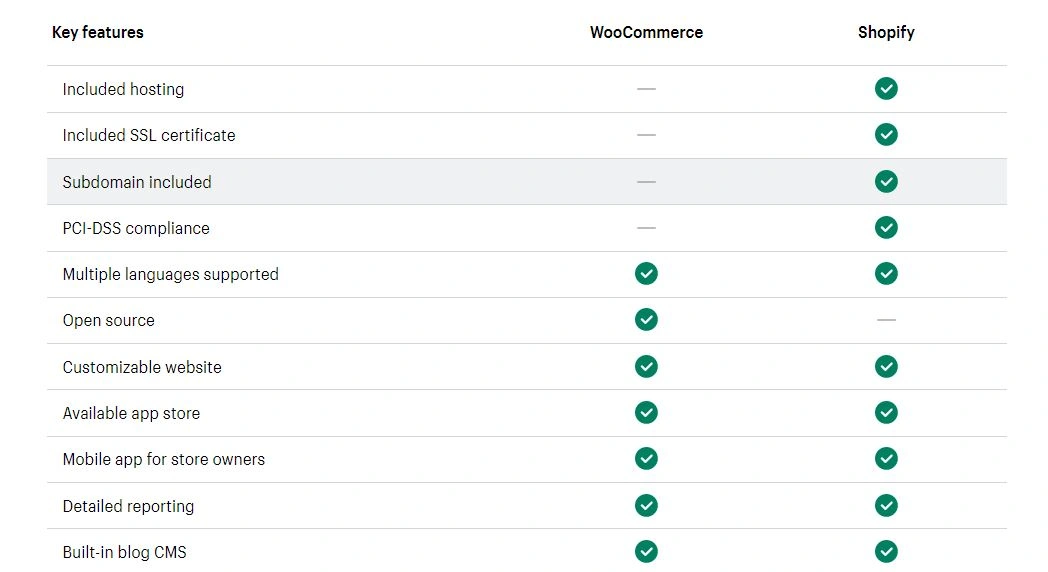Get access to exclusive updates, the latest news and the inside scoop 🍨

Is WooCommerce Or Shopify The Best Platform? 🥇
Have you ever wondered whether WooCommerce or Shopify is the best platform for your ecommerce business in 2022?
Don't want to read the whole article? 😏Click here for chapters

Written by Madeleine
WooCommerce or Shopify? 💻
Have you ever wondered whether WooCommerce or Shopify is the best platform for your ecommerce business in 2022?
As a passionate Shopify design agency that is dedicated to the platform, we here at Karmoon are aware that Shopify is the preferred solution for millions of online stores around the world.
From fresh builds, migrations, start-ups and enterprise-level stores, Shopify provides a range of services for companies of various shapes, sizes, and levels of experience.
Naturally, the ease of setting up and managing an online store plays a big part in the platform's appeal to new merchants, but what other characteristics distinguish Shopify stores from the likes of a WooCommerce website?
This is the question that we will aim to answer within today’s guide, as we delve deeper into the details of whether WooCommerce or Shopify is better for online stores in 2022.
WooCommerce or Shopify 2022 - Key Features 🗝️
Before we get started on whether WooCommerce or Shopify is the better platform for ecommerce businesses in 2022, we'd suggest taking a quick look at their key features below:


Why Is a Shopify Store Stronger Than a WooCommerce Website?
N0.1: Reasonable Price Point
Does WooCommerce or Shopify offer the most reasonable pricing for its customers?
Well, WooCommerce and WordPress are both free open-source platforms, however, there are expenses associated with each of these solutions.
If you’re serious about building and managing a safe, reliable and functional WooCommerce website, additional expenses may include; hosting, SSL certificates and plugins.
On the other hand, Shopify’s monthly subscription includes; hosting, unlimited storage, and an SSL certificate, but one of the main advantages of this platform is that the cost of hosting will not increase as your company expands, maintaining a reasonable price point.
N0.2: Out of the Box Solution
If you’re wondering whether WooCommerce or Shopify is the better option for your online business, Shopify offers an out-of-the-box solution.
This means that when you sign up for Shopify, you’ll be just steps away from completing your online store and you’ll even be able to choose your domain name at the point of signup!
However, merchants with a WooCommerce website must first; sign up for hosting, purchase a domain and then register for WordPress to integrate WooCommerce as a plugin.
So, it’s fair to say that the setup process for a WooCommerce website is a little bit trickier in comparison to Shopify due to the need to manage separate components manually, whereas Shopify bundles these all together for merchants using the platform.
N0.3: Reliable Customer Support
In the comparison of a WooCommerce website to a Shopify store, there’s one clear platform in the lead when it comes to customer support.
See, merchants on Shopify have access to 24/7 support via; phone, chat and email, not to mention some forms of support are available in multiple languages.
Stores on Shopify also have access to a variety of; help docs, blog posts, online courses and even webinars to help kick-start your ecommerce journey.
WooCommerce also offers its customers support in the form of; tickets, WooCommerce docs, live chat, email and blog posts, but we’d say that Shopify’s support is much more varied, interactive and reliable compared to that of WooCommerce.
N0.4: Free Subdomain
Will WooCommerce or Shopify take the trophy when it comes to receiving a free subdomain?
Well, every new customer on Shopify will receive a free subdomain on.myshopify.com. So, if you’re eager to get your store its domain name, Shopify makes the process super easy with just a few clicks!
To find out if a domain name is available for your Shopify store, simply use the Domain Name Generator, a free tool that will enable you to find the perfect domain for your website.
However, WooCommerce website users will need to purchase a domain name through a third party, as a subdomain is not included with this platform.
N0.5: SSL Certificate
On WooCommerce and Shopify, it is possible to have an SSL certificate, which will keep your website secure, but merchants on Shopify won’t have to give this a second thought as an SSL certificate is automatically included for websites on the platform.
So, what’s the deal with a WooCommerce website? Well, customers of this platform will need to set up an SSL certificate manually, which makes Shopify the smartest and easiest option when it comes to website security.
N0.6: Unlimited File Storage
Even though WooCommerce and Shopify both offer file storage to their customers, Shopify presents its merchants with unlimited storage, which is automatically included within a monthly subscription plan.
However, WooCommerce website owners will need to pay $29 per year through an Amazon S3 Storage plug-in to access better file storage.
Therefore, we believe that there is a clear leader in the WooCommerce or Shopify battle where file storage is concerned.
N0.7: Multiple Language Support
If you’re hoping to translate your website into multiple languages for international shoppers across the globe, this is possible with WooCommerce and Shopify.
Did you know that Shopify allows its merchants to take advantage of an unlimited number of languages through its International Domains product for those on the Shopify Advanced and Shopify Plus plans?
Furthermore, users of the platform also have the option to purchase domain names for all regions or use a subdomain instead.
The choices are considerably more limited for WooCommerce website customers, as the platform recommends using Multilingual Press, a commercial plug-in with a starting annual cost of $99 for up to three languages.
N0.8: Website Loading Speed
If you didn’t know it already, Shopify takes the loading speed of its websites very seriously and to that end, a team of performance specialists are dedicated to keeping Shopify sites loading as fast as possible.
Are you curious about the loading time of your Shopify store? Check out your site's speed score and make necessary updates to keep it running as quickly as possible in Shopify's admin.
WooCommerce on the other hand has no control over how quickly websites on its platform load, as this will vary based on the user’s choice of hosting provider and whether servers are shared with other large websites.
Additionally, other outside variables will all affect how quickly your website loads. For instance, WooCommerce website users often add multiple plugins to their website, which can decrease the loading speed of their website.
Therefore, we believe that there is a clear winner in the WooCommerce or Shopify comparison for the fastest website loading speed.
N0.9: PCI-DSS Compliance
To ensure that all credit card information is stored securely, all businesses must adhere to the Payment Card Industry Data Security Standard.
Shopify possesses Level 1 PCI-DSS certification, whereas WooCommerce isn't automatically compliant, though a third-party plugin can be implemented to maintain compliance.
If your WooCommerce website needs to become PCI-DSS compliant, one plugin that complies with PCI-DSS is Stripe, but Shopify stores will automatically follow Payment Card Industry Data Security standards.
N0.10: Reliable Uptime
Whether a merchant is on WooCommerce or Shopify, the goal of online retailers is to make the most of their ecommerce store.
However WooCommerce customers will need to locate a reputable host themselves, as WooCommerce doesn't handle hosting, whereas Shopify merchants can rely on the platform’s reliable hosting and uptime.
Why Do Merchants Prefer Shopify over WooCommerce?
Comprehensive App Collection
Is the WooCommerce or Shopify app collection more supportive to its users?
Well, as both Shopify and WooCommerce offer apps to their customers, the terminology between the two platforms does differ.
WooCommerce refers to apps as “extensions” whereas WordPress refers to them as “plugins”, but no matter what terminology online stores may use, Shopify offers the biggest collection of applications to its customers.
With more than 6,000 apps available to use within the Shopify App Store, Shopify takes the lead with its comprehensive app collection as compared to WooCommerce which offers approximately 575 extensions for its users.
Handles Product Launches
Due to the hosting options and its reliable uptime, Shopify is used by millions of merchants to launch online stores, handle multiple product launches and scale ecommerce brands.
However, WooCommerce website owners have no direct control over hosting, therefore merchants will need to research and select a reliable provider, which is why we’d recommend Shopify to handle all of your store’s product launches.
Specialises in Ecommerce
As a platform, Shopify was built specifically with ecommerce in mind, whereas WooCommerce was built on WordPress, which is a CMS.
Simply put, this means that the ecommerce element was added for WooCommerce website owners after the main product was created, whereas the core principles of commerce were integrated into the heart of Shopify’s ecosystem from the very beginning.
Detailed Analytics
It’s important to note in the comparison of WooCommerce or Shopify that Shopify provides retailers with access to a wealth of in-depth analytics data, including; an overview dashboard, financial reports, product reports as well as many others.
Recently, though, WooCommerce added an analytics tool of its own for customers to utilise.
However, WooCommerce’s new tool is only compatible with WordPress 5.3 and onwards, so it’s not a reliable solution for every customer on the platform.
Reliable Development
Both Shopify and WooCommerce website owners have developers working on their products, but as the majority of Shopify’s elements are indeed controlled by Shopify’s internal team of developers, we’d have to say that our beloved platform is more reliable with its in-house development team.
WooCommerce on the other hand is a little bit more disjointed and heavily dependent on WordPress plugins or extensions, which may not be constantly updated by developers for bugs and issues.
So, if you’re looking for a reliable platform with a dependable development team at its fingertips, Shopify would take our vote here.
Launch on the Same Day
With Shopify, merchants can set up and launch a store on the very same day, whereas with a WooCommerce website, you’ll need to purchase a domain and point it to the server, which can take up to 72 hours to process.
While this is also true for Shopify’s customers, the platform offers a subdomain that merchants can set up and build out while you wait.
Create Multi Stores
Many entrepreneurs choose to run multiple ecommerce stores and both Shopify and WooCommerce offer multistore capabilities to their customers.
However, it should be understood that Shopify offers this feature through the Shopify admin, whereas WooCommerce customers will need to install a plugin to manage multiple stores.
So, if you’re wondering whether WooCommerce or Shopify would be the best option for you to run a multi-store business, we’d shoot with Shopify every time!
Built-In Fraud Detection
Did you know that Shopify has a built-in fraud detection feature to enable merchants to view a risk assessment for every order?
For WooCommerce website users to experience similar security measures, the platform offers an anti-fraud extension at $79 a year for its users.
WooCommerce or Shopify? - FAQs
Have a few questions? See the section below for some of the most commonly asked questions when comparing WooCommerce to Shopify:
N0.1: Which Is Better: WooCommerce or Shopify?
For those seeking; a simple setup, built-in security features, dependable hosting, a plethora of apps and more, Shopify is the preferable platform up against WooCommerce.
Why? Well, WooCommerce was built on top of WordPress's emphasis on content, whereas Shopify was created exclusively for online commerce.
Therefore Shopify is the right platform for businesses who are looking to create a reliable website that has the potential to expand, whereas WooCommerce can be used to build a content-based website.
N0.2: What’s The Difference Between a WooCommerce Website and a Shopify Store?
Even though WooCommerce is an open-source platform, Shopify provides its merchants with a wide range of features at their fingertips.
Therefore, the key difference between a Shopify store and a WooCommerce website is that Shopify provides its customers with; hosting, an SSL certificate, a subdomain, 24/7 support, built-in fraud detection, more than 6000 apps via the Shopify App Store and many other features that are automatically included on the signup.
On the other hand, WooCommerce mainly relies on third-party plugins to offer many of the capabilities that are needed to run an online store.
N0.3: Is WooCommerce or Shopify Better for Security?
If you’re curious about whether WooCommerce or Shopify would come out on top in the battle for website security, we’d have to say that Shopify is our winner.
Why? For one simple reason - Shopify is PCI-DSS compliant and includes an SSL certificate when merchants sign up to the platform, whereas WooCommerce isn't secure until users set it up to be by adding extensions and/ or WordPress plugins to their website.
N0.4: Is WooCommerce or Shopify Better for Uptime?
Millions of well-known; brands, celebrities and business owners rely on Shopify to kick-start their websites due to the platform’s reliable and consistent uptime.
However, when it comes to determining WooCommerce’s uptime, this is a bit more of a challenge as the uptime of this platform is largely dependent on the hosting provider selected.
So, if you’re looking for certainty over a possibility, we’d recommend going with Shopify to guarantee your business a steady uptime
N0.5: Can a WooCommerce Website Accept Payments via Shopify?
Did you know that store owners can take Shopify Payments through a WooCommerce website?
How? By subscribing to Shopify's $9.00 USD Lite Plan of course! With this plan, merchants will be able to add a Buy Button to any WooCommerce website.
Ready for your WooCommerce website to begin accepting Shopify Payments? Click the link to learn more about the Shopify Buy Button as a tool.
N0.6: Is WooCommerce or Shopify More Affordable to Run?
While WooCommerce and WordPress are both free options for merchants to launch and run an online store, there are still expenses related to operating an online store, such as a hosting service, SSL certificate as well as any other plugins or extensions you may require.
On the other hand, Shopify’s pricing starts at $9.00 USD per month, though most users will start on the $29.00 USD per month plan which includes many of the features required to run an online store.
So, you could say that while Shopify may seem to have a higher price tag on the surface, this may not necessarily be the case once those expenses begin adding up for WooCommerce website users.
N0.7: Is WooCommerce or Shopify Better for Ecommerce?
This question is like asking if your right foot will feel more comfortable in the left shoe or the right shoe. Naturally, the answer is obvious, but not everyone knows that Shopify is the right shoe in this comparison.
So, for the sake of those who want to know whether WooCommerce or Shopify is better for ecommerce stores on the web, it’s a no-brainer. Shopify would win this round hands down.
Why? Simply because Shopify was built for ecommerce whereas WooCommerce was built after WordPress was created as a plugin instead of an integrated product.
Plus Shopify offers its merchants access to more than 6,000 apps and integrations, an easy-to-setup store builder and an award-winning 24/7 support team to name a few perks!
N0.8: Is WooCommerce or Shopify POS Better?
With more than 1,700,000 trusted users already on board, Shopify POS is an efficient system for integrating online retail with sales and this remarkable feature stands out from the competition through its Lite and Pro plan.
Shopify POS Lite is a free option that provides solutions for a variety of devices such as; printers, cash registers and more.
On the other hand, the Pro plan includes all of the point-of-sale features at $89 per month and a 14-day free trial is available to those who would like to give Shopify POS a try with no payment required.
Additionally, Shopify POS also integrates with Shopify Payments, enabling merchants to accept multiple payment methods within their online store.
Note: If you’re using Shopify for your ecommerce website, we would highly recommend using Shopify POS for your retail sales, as Shopify specialises in bringing online and in-person; inventory, payments, reporting, and customer profiles together.
Why is this important? Well when all your business data is in one place, it’s easier to manage inventory, keep track of payments, and give customers the service they expect, like buy online, pick up in-store and more.
WooCommerce on the other hand also offers its customers an advanced POS toolkit which is suitable for; market stalls, food and drink vendors, vape stores, jewellers and more, but the cost of this toolkit comes in at around $199 per year, making Shopify the more affordable option.
However, a 30-day money-back guarantee is provided if the user is not satisfied with their product or service, so that is a perk, but in the grand scheme of things, we’d say that Shopify POS comes out on top.
So, that concludes our analysis on whether WooCommerce or Shopify is the best platform for ecommerce businesses in 2022. What are your thoughts? Reach out and let us know.
If you’re actively looking to work with a Shopify agency designer or developer to assist you with your business, we’d love to hear from you. Get in touch to get started!
Get Started with Shopify
Looking to get started with Shopify? Take advantage of Shopify's 14-day free trial, no credit card is required.
If you're actively looking to work with a Shopify agency designer or developer to assist you with your business, we'd love to hear from you. Get in touch to get started!
Want to read some more?
Have a look over more posts related to this one















